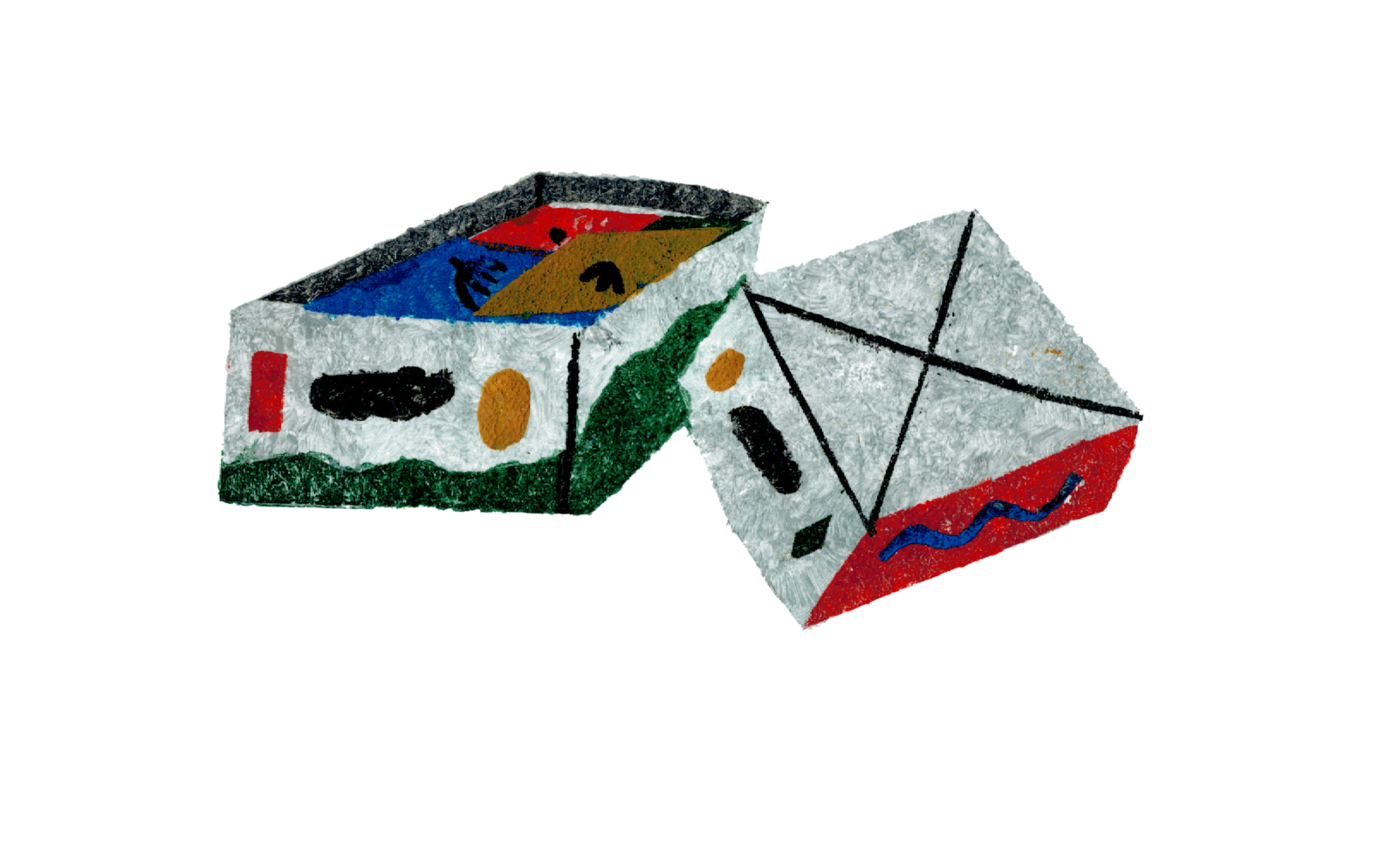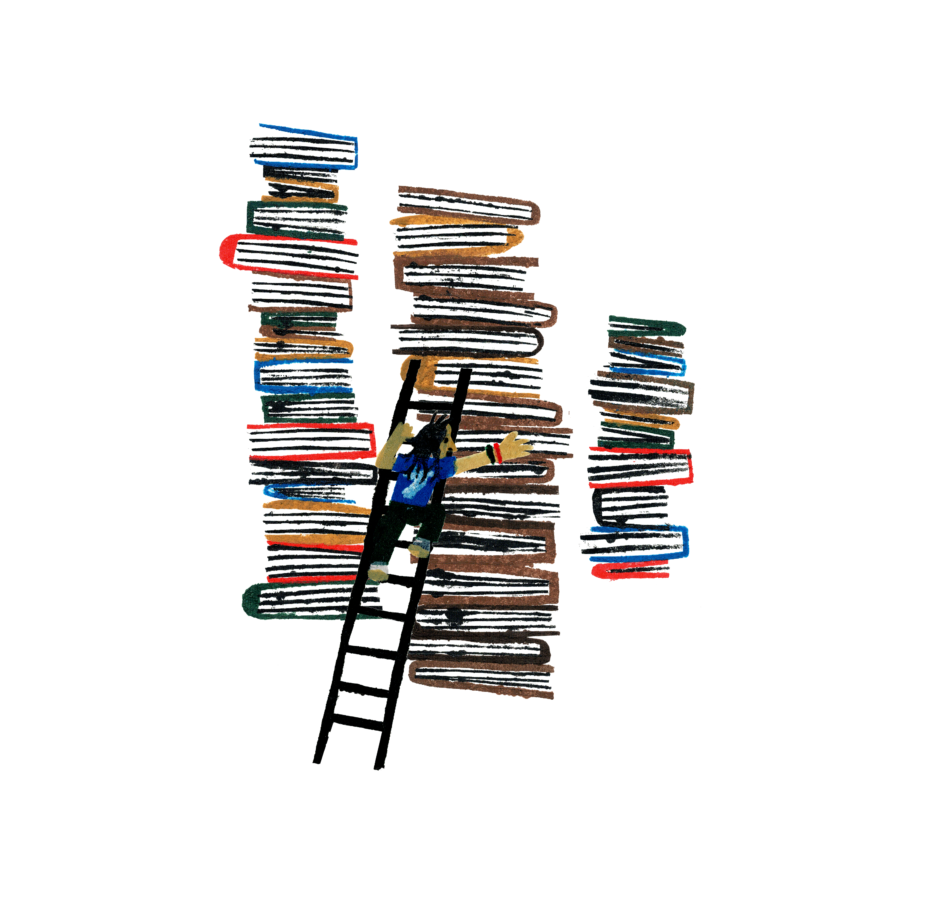Second-hand Bookshops: Second-hand Souls Petr Vizina
They liken the pages of books to the leaves of trees – and they mourn their demise in the same way. Second-hand bookshop owners are ahead of the times in their ecological thinking about books. But to say that you can come to their shop to choose a book would not be entirely accurate.
Prague’s Maniny district was famous for workers’ spartakiads (mass gymnastic displays) during the Czechoslovak First Republic, which is perhaps why the long avenue to the Vltava River, which turns northwest here, is still called Dělnická – Workers’Avenue. Next to the futuristic Parallel Polis, where you can use bitcoin to pay for a cappuccino with oat milk, towards the Libeň Bridge, you can have a perhaps even more surprising encounter with another parallel world, perhaps even universe. There are stacks of yellowed books piled in the dusty windows of a former household goods shop, as if someone were moving; it most likely looks similar inside. It’s hard to say because with the exception of Jiří Novák, a slight man in his sixties in a black T-shirt, who has been running the second-hand bookshop for some twenty-five years, no one else can fit into the book-filled establishment. The owner named the shop, whose shabby goods in the windows resemble a flea market, Morbido. Contrary to its funereal name, however, the place and its owner seem to be flourishing.
The quirky character of the dealer in old books and his business began to catch the attention of first the local and then the national media. There’s even an online fundraising event to help the place where time stops (which is also why the locals often stop here for a chat), to contribute to the rent. “My son was intrigued by the trains, the Steam on the Rails book you have in the shop window. And you had two more on the same subject there yesterday. Are they gone yet?” asks a dad with two kids on foot to floor ride on toys. The owner, standing as usual outside the entrance next to more boxes of books, nods. He has already sold the books, but encourages the father with the kids to stop on their way home for something similar. The situation repeats itself several more times; the desired book may be there, it just can’t be given to the customer so easily. “I have a photographic memory, but if someone moves a book to a different stack, it doesn’t help,” says Mr. Novák explaining his storage system, which doesn’t require a computer or an Excel spreadsheet. The stacks are organised by author, title, and genre. “If you tell me you want Remarque or Karolína Světlá, I know where to look,” he assures us. The payment process is similarly original. “People don’t have cash on them, they mostly pay for everything by card these days. To avoid delaying them, I usually shove a book in their hand, saying they can pay me when they next pass by. It works, but of course I don’t have the brain capacity to keep track of debtors. One time a lady came in with three hundred and sixty crowns. I asked her when the debt dated from. From Christmas, she said. But the one before last. I am a deterrent example of entrepreneurship,” laughs Novák, a former police officer who subsidises his second-hand bookshop “business” with night shifts as a receptionist. In the course of our conversation, a few more passers-by stop for a chat. Novák’s second-hand bookshop is unlikely to be an example of business efficiency, but it can be taken as a reminder that books are not just a silent fetish in collectors’ libraries but rather part of the human environment and human relationships. “It’s like a discussion group here, all the pensioners drop in, I’ll give the dogs a biscuit. Last time there was a lady here complaining she couldn’t find a partner. But that’s well on the boil now,” smiles Novák.
He often buys books from estate sales or when people are moving. “But because people don’t read much, I take books to charities, old people’s homes, long-term bedridden patients… I talk with them about what they want to read.” He has been following the changing interest in books and disagrees with the observation of reading specialists that reading is seen as a kind of unproductive daydreaming, a dawdling and a relaxation, which is why it’s mostly women who read books. “It’s not true that women read more. Men read too, but in general, instead of leisure reading, there is an interest in books that help one develop,” Novák explains. “Personal development, esotericism, any kind of craft guide, blacksmithing, carpentry, roofing, a lot of people do business and lack the relevant literature. There’s also interest in manuals for old vehicles. But guys are also looking for books to help them escape the stress they suffer from at work. Freud and Jung are sold almost immediately,” he says. In addition to gender stereotypes, the digital world has also had an impact on sales. “No one cares about university textbooks anymore, for example. My shop window is full of dictionaries and not a single one has been sold in a year,” says Novák.
Luboš Samek is another similarly noticeable figure in his neighbourhood. His second-hand bookshop is located in Dejvice, a quarter of an hour by tram from Novák’s. This is not shabby Dělnická, but a rather posher district. In the case of Mr. Samek, a peer of Mr. Novák’s and a qualified natural scientist, it is clear that when the blinds are drawn, not even the owner himself can fit into the shop on Jaselská Street. The stock of goods he is supposed to trade in has even spilled over into a nearby café, which has thus acquired an interesting library.
In a sense, Samek fulfils the idea of a second-hand bookseller being someone who knows it all. In conversation, his thoughts branch and develop in fractals, countless digressions and endless associations. Time seems to slow down around his shop. The answer to an ordinary question can therefore take the form of an arc that extends for an hour. “Do you know who Dobroslav Líbal was? Do you know Alexander Goldschneider?” he asks right at the outset, drawing on his vast reserves of encyclopaedic erudition. Nor does Mr. Samek consider a book to be a mere article made of paper. In fact, he claims that a book will call to the person it wants to be with. He has developed his own method of screening shoppers to see if their interest is serious. Naturally, if second-hand books are looking for new readers, it is the secondhand bookseller’s duty to prevent the book from falling into the wrong hands. “I stand up for books that nobody wants. We should protect every printed page, just as we should protect the leaf of a tree. We do not know how to behave as a civilisation. We want things immediately and, if possible, for free,” he replies. The speech takes a circuitous route, turning for a moment to Mr. Samek himself, then to ecology and the curses of the digital age. He considers it an evil when books that no one reads are removed from public library collections. “The invisible hand of the censor used to rule in the past, today the visible hand of the market rules,” is the metaphor he offers for the present day.
The two gentlemen are too different to draw any general conclusions or deeper lessons about the ecology of the book market on the pavement outside their second-hand bookshops. Perhaps the one offered by Jiří Novák will do, when he momentarily flies away in a dream and forgets about the next rent payment. “Books are not ordinary goods,” he glances at the dusty shop windows, “they have a soul. They can invite you into another world.”



